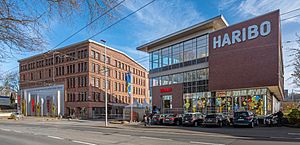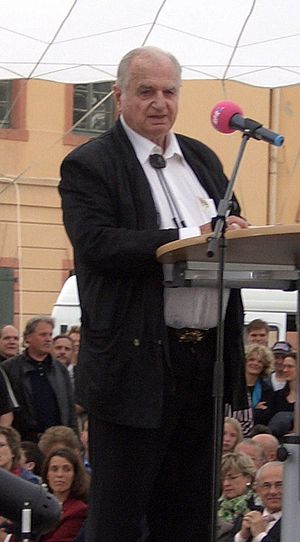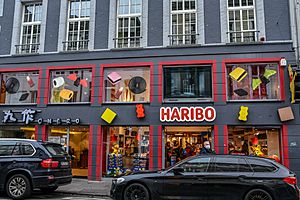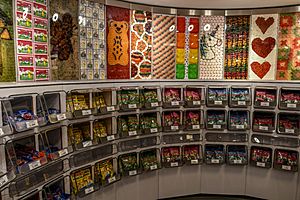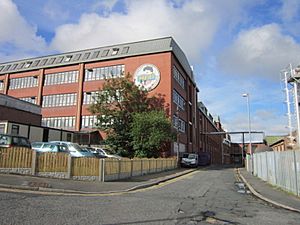Haribo facts for kids
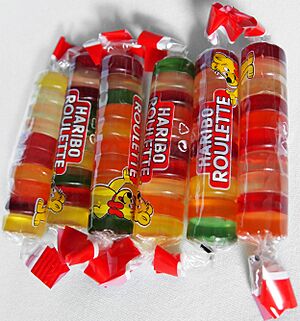
Haribo Roulette Candy
|
|
| Private | |
| Industry | Confectionery |
| Founded | 13 December 1920 |
| Founder | Hans Riegel Sr. |
| Headquarters |
Grafschaft, Rhineland
,
Germany
|
|
Area served
|
Worldwide |
| Products | Candy, especially gummy candy |
| Revenue | €1.7–2.0 billion |
|
Number of employees
|
~7,000 (2018) |
Haribo is a famous German candy company. It was started by Hans Riegel Sr. in Bonn, Germany. The name "Haribo" comes from the first two letters of his name and the city: Hans Riegel Bonn.
Haribo is known for making the very first gummy candy. They created little gummy bears called Gummibärchen in 1922. Today, Haribo's main office is in Grafschaft, Germany.
Contents
The Story of Haribo
Haribo officially began on December 13, 1920. Its founder, Johannes Riegel, registered the company. In 1921, his wife, Gertrud Riegel, became the first employee. Haribo started with simple tools: a sack of sugar, a copper pot, a marble slab, a stool, a stove, and a roller.
That same year, Hans Riegel bought a house in Bonn. This house became Haribo's first candy-making place.
How Gummy Bears Were Invented
Just two years after starting his company, Hans Riegel invented the first version of the Goldbear. It was called Tanzbär (Dancing Bear). These early gummy bears were bigger and softer than today's. They were made using gum arabic instead of gelatin.
In 1925, Haribo started making licorice candies too. By the early 1930s, the company had grown. It set up a sales team and built a new main factory.
Haribo After World War II
During World War II, Haribo's candy production slowed down a lot. This was because it was hard to get the ingredients needed.
After Hans Riegel Sr. passed away in 1945, his wife continued to run the company. In 1946, their sons, Hans and Paul, returned home and took over.
Hans Riegel Junior was the face of the company. Paul Riegel was in charge of creating new candies and rarely appeared in public. Haribo grew by buying other candy companies. In 1957, they bought Kleutgen & Meier. In 1961, they took over Bonera in the Netherlands, renaming it Haribo Nederland BV.
In the 1960s, Haribo opened a new main office in Bonn.
Expanding Around the World
Haribo began to expand internationally in the 1960s. In 1967, they bought part of a French candy factory, which became Haribo-France SA. Later, this merged with another French company to form Haribo Ricqles-Zan. This company has a small factory museum in Uzès, France.
In 1968, Haribo also bought shares in a German company called Dr. Hillers. They fully took it over in 1979. This factory in Solingen was expanded several times.
Haribo continued to grow by taking over many local candy makers worldwide. They entered the American market in the 1980s.
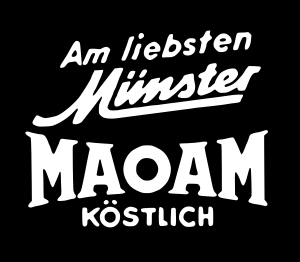
In 1986, Haribo bought the rights to the Maoam candy and Haribo Chamallows. By 2013, Haribo had 16 factories. These factories produced over 100 million gummy bears every single day!
In May 2018, Haribo moved its main office from Bonn to Grafschaft. However, Bonn still has a Haribo factory.
Leadership Changes
Hans Riegel Junior had planned for his nephew, Hans-Jürgen Riegel, to take over. But they had a disagreement, and Hans-Jürgen left the company in 2005.
Paul Riegel, Hans Junior's brother and co-owner, passed away in 2009. After this, the family worked together to decide how the company would be run.
In 2010, a new structure was created for Haribo. Paul Riegel's sons, Hans-Guido and Hans-Arndt, took on important roles. Hans-Guido became a managing director for production and technology. Hans-Arndt became the chairman of a new supervisory board.
Hans Riegel Junior passed away in 2013. His role was then filled by the Hans Riegel Foundation, which he had created in 1987.
Haribo Today
Haribo now has about 7,000 employees. They have four factories in Germany and ten more in other European countries. By 2003, Haribo products were sold in over 100 countries.
Moving the Main Office
For many years, people wondered if Haribo would move its main office from Bonn. The old location didn't have enough space to grow.
In April 2018, Haribo officially moved its main office to Grafschaft. Some factory work still happens in Bonn.
All About Goldbears
Goldbears are Haribo's famous fruit gums. They are shaped like small bears, about two centimeters tall. They are made from sugar, sugar syrup, colors, and flavors. They also contain things like acid to make them a bit tart, and gelatin to give them their chewy texture.
Since 1960, Haribo has called its gummy bears "Goldbears." This helps people know they are Haribo's original gummy bears. In 2005, Haribo made about 100 million Goldbears every day! They are made in 15 factories across Europe and sold in over 100 countries. Goldbears bring in the most money for Haribo. In Germany, almost everyone knows about Goldbears, and they are seen as a symbol of "childlike happiness."
For the German market, Goldbears are colored with natural fruit extracts. Even though it's possible to make blue gummy bears, Haribo wants to keep the traditional colors.
In 2007, Haribo changed the Goldbear flavors a bit. Apple became a new green flavor. Strawberry, which used to be green, changed to light red. The Goldbears also got a small change to their shape, giving them a smiling face.
For the UEFA European Championship in 2008, Haribo made "Schwarz-Rot-Goldbären." This mix had black, red, and yellow gummy bears, like the German flag. The flavors were blackcurrant (black), raspberry (red), and lemon (yellow). It was the first time Haribo made black Goldbears.
For the FIFA World Cup in 2014, Haribo created the "Goldbären-Fan-Edition." This mix included flavors like cherry (dark red), grapefruit (red), watermelon (green), woodruff (dark green), apricot (orange), and blue blueberry-flavored Goldbears.
Haribo also makes a halal version of Goldbears for some countries, like the United Kingdom. These are made in Turkey using beef gelatin that follows Islamic dietary laws. They have a special halal certification on their packaging.
Haribo in the UK
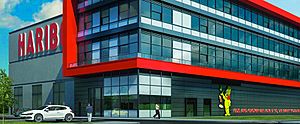
Haribo started selling sweets in the UK in 1972. They bought a company called Dunhill's, which made liquorice Pontefract cakes.
Some of Haribo's most popular brands in the UK are Starmix, Tangfastics, Supermix, and Maoam. Maoam is a brand of chewy sweets that Haribo bought in 1986. Haribo makes Pontefract Cakes at its factory in Pontefract, West Yorkshire. The company also has seven shops in the UK.
Haribo in the US
Haribo candies were first brought to Hawaii and California in 1972. By the late 1970s, they were sold all over the United States.
In the 1980s, Haribo of America was started in Baltimore, Maryland. Haribo's gummy candies became widely available in US stores. The packaging was changed to English, and the candy weights were adjusted for US sizes.
Sales quickly grew, and gummy bears became very popular in the US. Other companies soon started making their own gummy bears too.
In 2015, Haribo of America moved its main office to Rosemont, Illinois. In 2017, Haribo announced plans for its first US factory. This large factory, located in Kenosha County, Wisconsin, started making Goldbears in 2023.
Haribo Around the World
Haribo continues to expand globally. They have opened test stores in Shanghai and Guangdong province in China. New factories have also opened in places like Castleford, West Yorkshire, UK.
In 2016, Haribo opened its first factory outside Europe, located in Brazil.
Haribo Slogans
Haribo has famous slogans around the world. In Germany, their catchphrase is "Haribo macht Kinder froh – und Erwachsene ebenso" ("Haribo makes children happy – and adults as well").
In English-speaking countries, the slogan is "Kids and grown-ups love it so – the happy world of Haribo." Other countries have their own versions of this fun slogan. For example, in Turkey, it's "Çocuk ya da büyük ol, Haribo'yla mutlu ol" ("Be a kid or a grown up, be happy with Haribo").
See also
 In Spanish: Haribo para niños
In Spanish: Haribo para niños
 | Shirley Ann Jackson |
 | Garett Morgan |
 | J. Ernest Wilkins Jr. |
 | Elijah McCoy |


